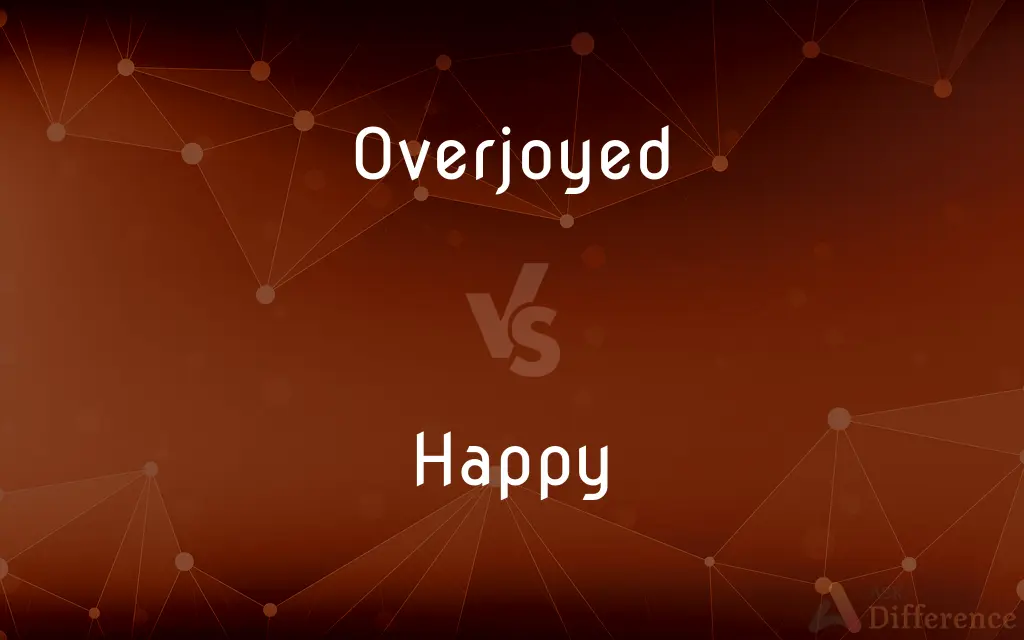Overjoyed vs. Happy — What's the Difference?
Edited by Tayyaba Rehman — By Urooj Arif — Updated on May 3, 2024
"Overjoyed" describes an intense, often overwhelming feeling of happiness, typically due to a specific event, while "happy" is a more general, sustained state of contentment and well-being.

Difference Between Overjoyed and Happy
Table of Contents
ADVERTISEMENT
Key Differences
Overjoyed implies a higher intensity of emotion, often experienced during particularly significant or unexpected positive events. This level of joy usually surpasses typical happiness, featuring strong physical and emotional reactions. Happy, on the other hand, describes a broader, more enduring state of pleasure or satisfaction that influences one's overall mood and outlook on life.
While "overjoyed" often results from specific achievements or good news, such as a wedding engagement or receiving a long-awaited promotion, "happy" can be derived from everyday pleasures and a general sense of life satisfaction. This includes enjoying a sunny day, spending time with loved ones, or feeling secure in one's life circumstances.
The expression of being overjoyed can involve more demonstrative behaviors like jumping, cheering, or crying tears of joy, showcasing a peak emotional response. Conversely, being happy might be expressed through a smile, a peaceful demeanor, or an overall relaxed state, reflecting a more moderate and stable emotional condition.
Overjoyed moments tend to be memorable and can significantly impact one’s emotional state temporarily. Happy, while positively impacting one's life, integrates into one’s baseline state of being, contributing to a positive demeanor and outlook over time.
In psychological terms, being overjoyed might be linked to a surge in dopamine and endorphins, which are neurotransmitters associated with pleasure and euphoria. In contrast, a general state of happiness is often correlated with a balanced life, fulfilling relationships, and mental and physical health, supported by a stable release of serotonin.
ADVERTISEMENT
Comparison Chart
Intensity
Very high, often overwhelming
Moderate, steady
Duration
Temporary, event-specific
Long-term, sustainable
Expression
Demonstrative (e.g., cheering, crying)
Subtle (e.g., smiling, calmness)
Causes
Specific events (e.g., achievements)
General well-being and life satisfaction
Psychological Basis
Surge in dopamine and endorphins
Stable release of serotonin
Compare with Definitions
Overjoyed
Feeling an intense level of happiness or joy, often due to a specific event.
She was overjoyed when she found out she had won the lottery.
Happy
Can be influenced by a variety of factors, including environment, relationships, and personal achievements.
She was happy to spend her weekend in the countryside, relaxing away from the city.
Overjoyed
Typically a peak emotional response, not sustained over long periods.
The athlete was overjoyed upon winning the championship but settled back into a normal routine afterward.
Happy
A feeling of pleasure and contentment in one's life.
She feels happy living in a city close to her family and friends.
Overjoyed
Can involve physical reactions such as jumping, shouting, or tears of joy.
He was overjoyed and couldn’t stop jumping up and down.
Happy
Tends to be more stable and less volatile than intense joy or euphoria.
Her happy nature is consistent, regardless of daily ups and downs.
Overjoyed
Often associated with significant life events that bring great joy.
They were overjoyed to meet their newborn grandson for the first time.
Happy
Often reflected in a positive outlook and demeanor.
His happy demeanor makes him very approachable.
Overjoyed
A state of extreme happiness, usually expressed in very active or visible ways.
The parents were overjoyed at their daughter's graduation.
Happy
A general state of well-being that encompasses life satisfaction.
They were happy with their modest but comfortable lifestyle.
Overjoyed
To fill with joy; delight.
Happy
Feeling or showing pleasure or contentment
They are happy to see me doing well
Melissa came in looking happy and excited
We're just happy that he's still alive
Overjoyed
Very happy.
Fans were overjoyed at / by the sight of their team handing the visitors such a decisive defeat.
After a long, arduous trek, we were overjoyed to catch sight of our destination at last.
Happy
Fortunate and convenient
He had the happy knack of making people like him
Overjoyed
(obsolete) Overly happy.
Happy
Inclined to use a specified thing excessively or at random
They tended to be grenade-happy
Overjoyed
Simple past tense and past participle of overjoy
Happy
Enjoying, showing, or marked by pleasure, satisfaction, or joy
A happy child.
The happiest day of my life.
Overjoyed
Extremely joyful
Happy
Cheerful; willing
Happy to help.
Happy
Characterized by good luck
A happy sequence of events.
Happy
Being especially well-adapted; felicitous
A happy turn of phrase.
Happy
Characterized by a spontaneous or obsessive inclination to use something. Often used in combination
Trigger-happy.
Happy
Enthusiastic about or involved with to a disproportionate degree. Often used in combination
Money-happy.
Clothes-happy.
Happy
Having a feeling arising from a consciousness of well-being or of enjoyment; enjoying good of any kind, such as comfort, peace, or tranquillity; blissful, contented, joyous.
Music makes me feel happy.
Happy
Experiencing the effect of favourable fortune; favored by fortune or luck; fortunate, lucky, propitious.
Happy
Content, willing, satisfied (with or to do something); having no objection (to something).
Are you happy to pay me back by the end of the week?
Yes, I am happy with the decision.
Happy
(Of acts, speech, etc.) Appropriate, apt, felicitous.
A happy coincidence
Happy
(in combination) Favoring or inclined to use.
Slaphappy, trigger-happy
Happy
Dexterous, ready, skilful.
Happy
Implying 'May you have a happy ~' or similar; used in phrases to wish someone happiness or good fortune at the time of a festival, celebration, or other event or activity.
Happy birthday!, Happy Fourth of July!, Happy anniversary!, Happy job-hunting!
Happy
A happy event, thing, person, etc.
Happy
Often followed by up: to become happy; to brighten up, to cheer up.
Happy
Often followed by up: to make happy; to brighten, to cheer, to enliven.
Happy
Favored by hap, luck, or fortune; lucky; fortunate; successful; prosperous; satisfying desire; as, a happy expedient; a happy effort; a happy venture; a happy omen.
Chymists have been more happy in finding experiments than the causes of them.
Happy
Experiencing the effect of favorable fortune; having the feeling arising from the consciousness of well-being or of enjoyment; enjoying good of any kind, as peace, tranquillity, comfort; contented; joyous; as, happy hours, happy thoughts.
Happy is that people, whose God is the Lord.
The learned is happy Nature to explore,The fool is happy that he knows no more.
Happy
Dexterous; ready; apt; felicitous.
One gentleman is happy at a reply, another excels in a in a rejoinder.
Happy
Enjoying or showing or marked by joy or pleasure or good fortune;
A happy smile
Spent many happy days on the beach
A happy marriage
Happy
Experiencing pleasure or joy;
Happy you are here
Pleased with the good news
Happy
Marked by good fortune;
A felicitous life
A happy outcome
Happy
Satisfied; enjoying well-being and contentment;
Felt content with her lot
Quite happy to let things go on as they are
Happy
Exaggerated feeling of well-being or elation
Happy
Well expressed and to the point;
A happy turn of phrase
A few well-chosen words
A felicitous comment
Common Curiosities
Can someone feel overjoyed frequently?
While it's possible, overjoyed feelings are typically tied to uncommon or special occurrences, making them less frequent than general happiness.
Is it healthier to be happy than overjoyed?
Both emotions are positive, but sustained happiness is generally considered healthier for long-term emotional and psychological stability.
Does being overjoyed impact one's physical health?
The intense rush of emotions when overjoyed can have immediate, albeit temporary, physical effects, such as increased heart rate and energy levels.
Can external factors influence one's ability to be happy or feel overjoyed?
Yes, factors like social environment, personal relationships, and economic stability play significant roles in influencing these emotional states.
What types of events typically make people overjoyed?
Events like significant personal achievements, receiving great news, or special life milestones often lead to feeling overjoyed.
How can one cultivate a happy state of being?
Cultivating happiness often involves engaging in fulfilling activities, maintaining good relationships, and practicing mindfulness and gratitude.
How do children express being overjoyed compared to adults?
Children often express being overjoyed more openly and vividly, such as through exuberant play and laughter, compared to adults who might express it more reservedly.
Is it possible to feel overjoyed without any specific reason?
Typically, overjoyed feelings are linked to specific causes, though spontaneous intense joy can occur in situations of relief or sudden good fortune.
What distinguishes feeling overjoyed from just being happy?
Feeling overjoyed is a more intense, often brief state triggered by specific events, while being happy is a more continuous, stable state of contentment.
What is the role of expectations in feeling overjoyed?
Expectations can heighten the sense of joy when they are exceeded, which is often a catalyst for feeling overjoyed.
What are the long-term benefits of being happy?
Long-term benefits include better health, longer life expectancy, and improved quality of life.
Are there any psychological disorders related to excessive feelings of joy?
Disorders like bipolar disorder can involve phases of mania, characterized by excessively joyful or euphoric states.
How do cultures around the world view happiness and being overjoyed?
Cultural perspectives vary, but many cultures value both everyday happiness and celebrating moments of great joy.
How can one differentiate between being happy and being content?
Happiness often involves a more active feeling of joy, while contentment is a more passive state of satisfaction.
Can lifestyle changes increase one's chances of feeling overjoyed?
Engaging in meaningful activities and setting achievable goals can increase the likelihood of experiencing moments of intense joy.
Share Your Discovery

Previous Comparison
Tripled vs. Trebled
Next Comparison
Brave vs. DaringAuthor Spotlight
Written by
Urooj ArifUrooj is a skilled content writer at Ask Difference, known for her exceptional ability to simplify complex topics into engaging and informative content. With a passion for research and a flair for clear, concise writing, she consistently delivers articles that resonate with our diverse audience.
Edited by
Tayyaba RehmanTayyaba Rehman is a distinguished writer, currently serving as a primary contributor to askdifference.com. As a researcher in semantics and etymology, Tayyaba's passion for the complexity of languages and their distinctions has found a perfect home on the platform. Tayyaba delves into the intricacies of language, distinguishing between commonly confused words and phrases, thereby providing clarity for readers worldwide.
















































